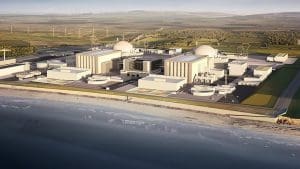
Nuclear must form part of a decarbonised portfolio of energy production, argued Grant Shapps, energy and net zero secretary.
He said: “If you want to get to net zero and get rid of hydrocarbons, we have to accept that base loads are required somewhere. Nuclear power can and should be part of that.”
Shapps told the Environmental Audit Committee yesterday that by launching Great British Nuclear, the government will provide a “much more stable platform” for those wanting to invest in nuclear power as well as more clarity on the trajectory and pace of its development.
He also revealed he will soon publish a detailed plan on the development and use of hydrogen and expressed his support for onshore wind, which he said is opposed by only four per cent of people, according to a government public attitudes tracker
The UK is under pressure to deliver a set of policies that would drive investment in low-carbon technology and match the Inflation Reduction Act in the US and the Green Deal Industrial Plan in the EU.
Analysts are expecting what has been dubbed as the government’s “Green Day” before the end of March, when it must abide by a High Court order and publish a revised strategy on achieving net zero.
Chancellor Jeremy Hunt reiterated in the Spring Budget the government’s desire to invest £700m in a new nuclear plant in Suffolk, £20 billion in carbon capture and storage (CCS) and he suggested that small modular reactors – a technology yet to be proved viable – could receive funding.
He also said nuclear power will be reclassified as “environmentally sustainable” while the government’s soon-to-be-launched Great British Nuclear scheme will boost investment in the industry.
Hunt was criticised for his focus on nuclear and CCS instead of insulation and renewables and MPs have questioned what has changed to make nuclear power environmentally sustainable.
Shadow climate secretary Ed Miliband said Labour wants to create “over a million” jobs in green industries.
He added: “The British people should benefit from our natural resources but still the Conservatives won’t back Labour’s plan for Great British Energy – a new, homegrown, publicly-owned, clean energy company to lower household energy bills.”
Mike Childs, head of policy at Friends of the Earth, said: “Backing expensive technologies like CCS and a new nuclear programme, while still blocking cheap onshore wind in England and failing to properly insulate the UK’s energy-leaking homes, will leave the UK hooked on high energy costs and falling behind in the global race to benefit from the transition to greener economies.”
Sam Alvis, head of economy at Green Alliance, said: “With the US and Europe spending huge sums on clean energy and green technologies like electric vehicles, we needed a budget that would encourage businesses to invest a green pound here rather than a green dollar or euro elsewhere. Instead, it feels like we are developing short-term investment schemes instead of a long-term plan for building the green economy of the future.”
Read more:
Grant Shapps backs nuclear power in net zero push

